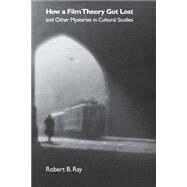How a Film Theory Got Lost and Other Mysteries in Cultural Studies
, by Ray, Robert B.- ISBN: 9780253214386 | 0253214386
- Cover: Paperback
- Copyright: 4/1/2001
In the 1920s, when film criticism was as new as the cinema itself, a particular way of thinking about the movies developed in Paris. The cinema, this theory suggested, turns on photography's automatism, the revolutionary fact that for the first time in human history, a perfect representation of the world can be produced by accident.Moreover, the camera's gaze has the potential to transform everyday life's most ordinary objects -- a telephone, a letter on a desk, a woman's face -- into spellbinding images, swarming with details whose precise appeal remains unpredictable. By the 1930s, this theory of photogenie (photogenia) had vanished from most serious writing about film. Why did this disappearance occur? In his collection of essays, Robert B. Ray discusses this mystery and others like it: Why did photography and the detective story originate at exactly the same time? Why has some of the most prominent academic writing about the cinema resisted anything but "scientific" accounts of the movies? What counts as "knowledge" in film studies or any intellectual discipline? What do the French Impressionists have in common with the Sex Pistols? How did Douglas Sirk's critically ignored melodramas become "subversive critiques of bourgeois ideology"? How is what happened to Sirk's movies a way to understand Postmodernism and the avant-garde? In taking up these questions, Ray's essays challenge certain ideas about film and cultural studies, while arguing for a mode of writing about the movies and experimental art that would respect the abidingly mysterious effect of their images and sounds.







